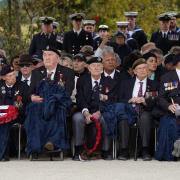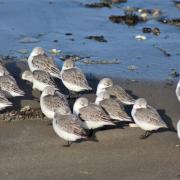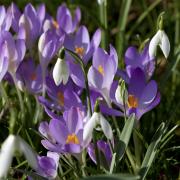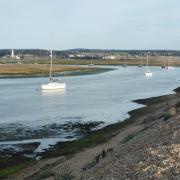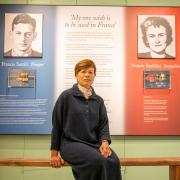Now working as an established war artist, Hampshire resident Pippa Blake owes it all to her inspirational teachers says Sandra Smith

If you had to choose an occupation which has had a significant influence in your life which would you opt for? The medical profession maybe? Well, the expertise of doctors to maintain our health and cure illnesses is undoubtedly crucial. But what about the police who play such a fundamental role in maintaining our security? Of course, there is also the skill of applying scientific knowledge to develop technological solutions displayed by engineers. Such tangible objects as roads, bridges, and machinery all contribute to the efficiency of our day to day lives. And let’s not forget the value of solicitors, chefs, architects and hair stylists. Each of these, along with many more, at various times can play a pivotal role in shaping our existence.
But there is one particular profession that I’ve yet to mention. One which has an all embracing function that can simultaneously inspire and motivate, perhaps even determine the career path you choose for yourself: teaching.
Unfortunately, many of us can also cite examples of teachers who achieved an A* in eradicating any morsel of interest in a subject, abandoning us with little more than negative memories. So my faith in this particular profession is restored during a refreshingly positive conversation with Pippa Blake. From her home on the shores near Chichester Harbour Pippa enthuses about not one but two art teachers who nurtured her talents. In fact, she also reveals a university lecturer who played a critical role in channelling her artistic learning.
“At boarding school our art teacher, Robin Child influenced many of us,” Pippa recalls. “We were in the art room every spare moment, even at weekends. It was a very dynamic place to be. From the age of 14 this subject became my main focus and I took my A Levels there, mainly because of this wonderful art master.”
Drawing on the encouragement of her tutor, Pippa then headed for Art School though her first choice did not turn out as expected. “I went to Reading University for an interview to read English and Fine Art but the head of the department, Claude Rogers, considered my work then suggested I look around the Art Department. It was full of abstract and conceptual stuff, nothing I could identify with such as still life or landscapes. Instead he advised me to go to Camberwell Art School. So I did.”
Although this was the right option, the young woman who had been raised “in a conservative way” initially underwent a shock to the system when immersed in such a tough neighbourhood. Thankfully, however, the move eventually played into her hands. “It took a couple of years to settle in but I’m so grateful because I actually like the seedier side of life.”
The third artistic influence came via Peter Norton who ran an Art School in the Dordogne. The young Pippa spent a “magical” month there, the mentor opening her eyes to more creative opportunities.
We may not have been engaging for long but already I feel energised. As this Portsmouth born artist recounts her formative experiences I find myself captivated by her recollections. It’s as bracing as the south coast to heed such encouraging memories.
So it is rather incongruous that the topics to which she is drawn border on the bleak.
“For the last two or three years my subject matter has been concerned with war; there’s no shortage of those. For a while I tried to get away but it kept coming back. It’s rather taken over now.”
Her work is certainly powerful, and thought provoking. Even her titles lure you into the mindset of the canvas. Your Moan Became a Prayer, for example, belies the simplicity of a man, head bowed, absorbed in his own thoughts. Similarly, The Trajectories of Rhetoric and Falling Bricks defies any viewer to avoid fashioning an opinion about the endless conflicts which dominate parts of our world.
Most of Pippa’s subjects stem from items witnessed on television news or the internet. “The emotional response moves me to another area,” she explains, adding that she bases many of her paintings on photographic images.
The hub of this artist’s life is a purpose built studio behind her house. Although it doesn’t have a view (“This would probably be distracting”) it accommodates her art books, notebooks, childhood drawings (“My mother kept everything”) and general artistic paraphernalia.
I’m curious to know if she has a favourite time of day in which to work. “I have spent my whole life trying to acquire a routine and it’s never happened,” she smiles. “I probably work four days a week and try to get in to my studio by 10am but I’m not an early morning person. I usually finish about 5pm unless I’m on a roll, then I’ll work longer.”
Although oil has remained Pippa’s preferred medium she works with soft chalks and charcoal, too, often utilising them within paintings. And watercolours? “I like to be physical when I paint; I’m very gestural with my arms. I have used watercolours in some studies but I’m just not competent or patient enough. Watercolour doesn’t suit me as a person, or my subjects. And then there’s waiting for drying times!”
Despite her penchant for large scale work - 6’x5’ canvasses are the norm - she also enjoys creating other dimensions and is about to embark upon a series of 22 small paintings.
“My work changes all the time,” she continues. “I am still emerging, always searching for the next thing and I never know what’s going to happen when I start a piece.”
Pippa usually concentrates on half a dozen paintings at the same time and strives to make the most constructive use of her work periods. “Overcoming the fear of it all going horribly wrong,” she confesses to be her greatest challenge. “I seem to start paintings and change them. Most have two or three paintings underneath. I find it frustrating; I am full of emotion and angst.”
Then how does she cope with shows? “I love meeting people and I have exhibited quite a lot although it is terrifying showing your work. But the older you get, the more your work gets out there.”
Never mind her self confessed anguish, the impression I am gaining during our talk is one of calm and level headed stoicism.
While present projects continue to excite her, she recognises that there is much more she could achieve as well as further directions to explore. “There are lots of possibilities. My dream would be to go and spend four or five months in a great big space with just my work things and a small bag of other stuff and books, and work like crazy. But that’s impossible.”
Impossible? I doubt that’s a term any of her inspiring mentors would have used. Nevertheless I understand the point. An artist’s fantasy of a block of time uncluttered by day to day minutiae must be as unlikely as it is appealing. But, of course, Pippa already has a portfolio of imposing paintings to her credit. And with memories of her teachers clearly remaining a source of motivation, this Hampshire artist’s flourishing career will surely continue to evolve.






